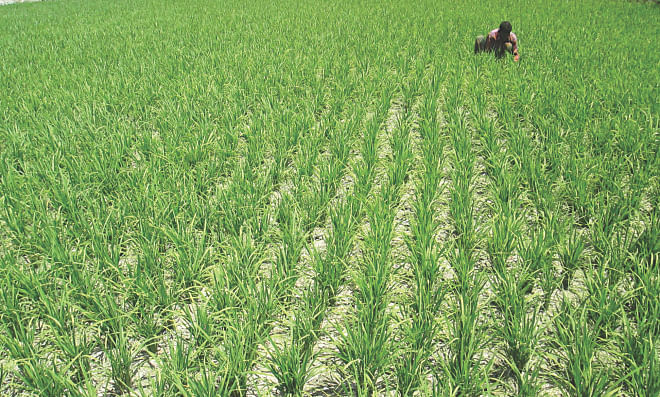Drought dampens Boro prospect
Drought dampens Boro prospect

A rather long spell of dry weather casts a shadow over the prospect of a good Boro harvest this season.
The agriculture ministry and the agriculture extension department (DAE) have sent letters to the power division, requesting it to ensure uninterrupted power supply so that farmers can irrigate their croplands for a good yield.
The country is experiencing lesser-than-an-average rainfall in March-April, and the agro-meteorology division of the Met office has suggested that farmers irrigate Boro crops at the last stage of grain-formation.
It also requested farmers to harvest mature crops without delay so that the standing rice, particularly in haor areas, is not lost to seasonal hailstorms or flash floods.
"The next 10 days are crucial for Boro. We're closely monitoring so that no rice is lost to hailstorms. As there is a lack of rain in many areas, farmers, particularly those who planted Boro late, are required to irrigate lands," Agriculture Minister Matia Chowdhury told The Daily Star yesterday.
With a production target of 18.7 million tonnes this year, Boro is the highest contributor among the three rice seasons -- Aus, Aman and Boro. The total rice yield in these three seasons is about 33 million tonnes.
The shortage of rain and lean flow of waters in the Teesta have caused problems for many Boro farmers in some of the northern districts, where rice production is usually high, said sources in the ministry.
"At places, farmers are required to spend more for irrigating Boro fields. It may increase the production cost. But we're still optimistic about a good Boro harvest," said Abdul Mannan, field service wing director of the DAE.
He added both the ministry and the department concerned have sent letters to the power division, asking it to ensure nonstop power supply for irrigation from 11:00pm to 9:00am every day.
As farmers in the haor regions do not want to take any risk of losing crops during hailstorms or flash floods, they have started reaping Boro early, he said.
"At least 25 percent of Boro rice in the haor areas have already been harvested," added Mannan.
Talking to this correspondent, Matia said farmers needed to irrigate their rice fields well now so that the grains could form properly.
She said there were some reports of paddy not forming grain from some parts of the country and that they sent out teams to inspect it.
According to her, excessive rain in some haor regions during Boro planting had some impacts on the crop. In some areas, farmers used various inputs excessively, which has led to the sterility.
A team from Bangladesh Rice Research Institute (BRRI) visited some fields in Chandpur recently and found that excessive application of fungicides rendered Boro rice sterile.